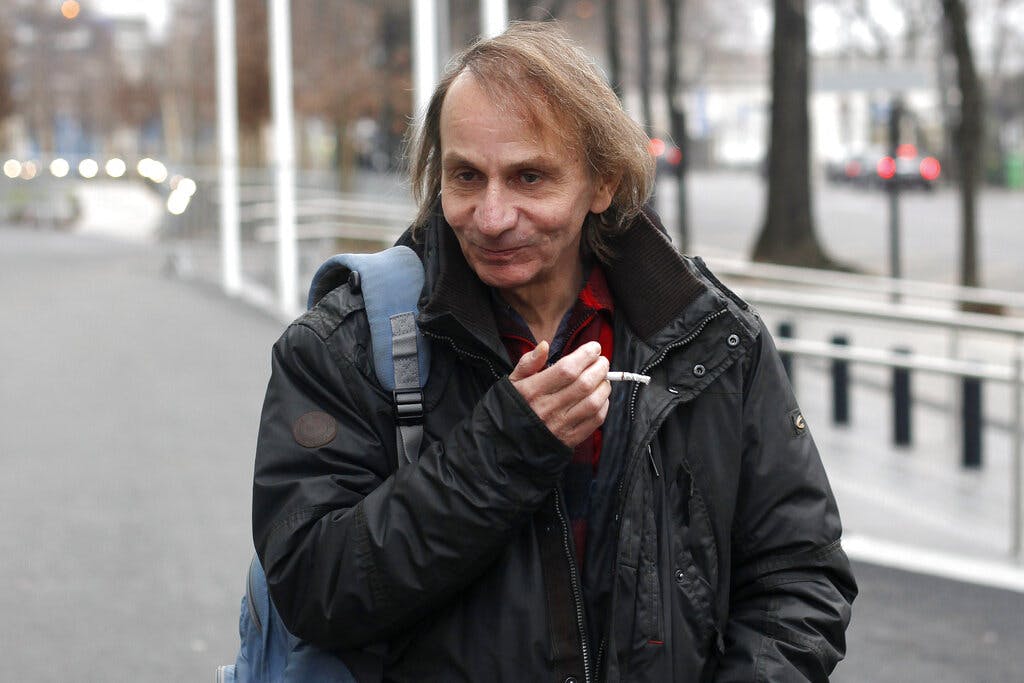Michel Houellebecq’s Latest Provocation Is Support for Israel
A writer often hailed as the most famous French novelist of his generation emerges as a staunch supporter of the Jewish state, which he asserts is ‘more essential than ever.’

The French novelist Michel Houellebecq, whose fiction paints a bleak picture of a Europe adrift and marbled with despair, is emerging as one of the few blue chip novelists willing to take Israel’s side against Hamas. For the contrarian, taking Zion’s part could be among his most perspicacious provocations.
Mr. Houellebecq is rare in his willingness to condemn the atrocities of October 7. “I’m still shocked by the reactions in France to the horrors” committed by Hamas, he tells Ynet, an Israeli outlet. He adds that he’s “been a clear supporter of Israel in the past,” and has no intention of changing that backing of the Jewish state. The screensaver on his phone is an image from Kibbutz Be’eri.
Mr. Houllebecq has also appeared on the Israeli airwaves, on the “Underground” program on Kan Tarbut Radio, suggesting an effort to talk to Jews and the Jewish state. To Ynet, he declares that “Israel is more essential than ever” and that “recent events in France, across Europe and the United States have proven, more than ever, that there needs to be a safe haven for Jews.”
The writer, flashing a mordant self-awareness, adds: “I’m supposed to be a depressed, depressing, disillusioned writer. That’s what I’ve read the critics say about me. Eventually I believed it myself. But this time, I was really way off with my illusions.” He adds that “best metaphor for the Jewish Question — and I don’t know who came up with it — is the canary in the coal mine.”
Mr. Houellebecq, who has made skewering blind spots of the left into something of a personal pastime, allows that he “was certain that even the worst leftists, the ones that unreservedly support the Palestinians and always criticize Israeli politics, would say they can’t stand behind what happened this time. I was sure there’d be a wave of sympathy and solidarity for the Jews.”
The author, though, reckons that the “extreme left has undergone an irreparable mutation,” visible in its hostility to the Jewish state. He recalls how the old left of his youth “would never have supported Hamas.” He denounces the current tribune of the French left, Jean-Luc Mélenchon, as a “nightmare” and a “genuinely dangerous man.” The author has “nothing but good things to say about Israel.”
Mr. Houellebecq is out of step with the literary zeitgeist. The Russian-American writer and journalist Masha Gessen compares the Hamas-controlled Gaza to the Warsaw Ghetto, and asserts that Israel is “liquidating” the Strip by waging a defensive war. An open letter in the New York Review of Books with dozens of signatories, including the celebrated writer Ta-Nehisi Coates, describes how “Hamas militants broke out of Gaza” and accuses Israel of “ethnic cleansing.”
Mr. Houellebecq, an enfant terrible of literature, has never conformed to the political pieties of the writerly elite. His work has been denigrated as reactionary and infected with animus toward Muslims, seen as catnip for incels and bigots. Still, he won France’s most prestigious prize, the Prix Goncourt, for his novel “La Carte et le Territoire,” wherein he imagined his own murder.
The misanthropic — and, some say, misogynist — writer catapulted to even greater fame with his novel “Submission.” That book was published on January 7, 2015, the same day as the Charlie Hebdo shootings, which earned it worldwide attention. Ten months later, a terror attack at the Bataclan theater left 130 dead and 413 wounded. The book imagines a France where an Islamist party, helped along by a leftist faction, wins the 2022 presidential election.
In conjuring an imagined run-off between the fictional Islamist candidate, Mohammed Ben-Abbes, and the leader of the right-wing bloc, Marine Le Pen, Mr. Houellebecq mixed fiction with prophecy, scooping political energies that now appear to be in full force. Just this week, President Macron struck a deal with an ascendant Ms. Le Pen to tighten immigration to the Fifth Republic.
Michel Gurfinkiel, writing in these pages, reported a recent imbroglio involving Mr. Houellebecq, where he speculated on a “Bataclan in reverse” when “acts of resistance” occur and “whole areas will be under Islamic control.” He previously opined, with characteristic bluntness, “You get appalled when you read the Koran. … At least, the Bible is a beautiful book, since Jews are awfully talented in literary matters.”
Mr. Houellebecq, while trumpeting his “absolute rejection of all monotheistic creeds,” has nonetheless demonstrated a sympathetic eye for the Jewish plight in France. A Jewish character in “Submission” flees with her family to Israel to escape persecution. Two years after that book was published, a Parisian Jew, Sarah Halimi, was murdered in her apartment and thrown out a window by an assailant yelling Alahu Akbar.
France’s reluctance to find an antisemitic motive for that crime and the subsequent ruling that the perpetrator, Kobili Traoré, was not criminally responsible because of his cannabis consumption signaled, for many French Jews, a darkening state of affairs. To many, the storm clouds have grown more threatening since October 7, with the interior minister, Gérald Darmanin, noting that the “number of antisemitic acts has exploded.”
Mr. Houellebecq, though, tells his Israeli interlocutors that he “supports them for moral reasons” in the face of the “rise of European nihilism.” He recalls reading an interview with Prime Minister Sharon in which the warrior politician reflected that the “hardest job in the world is being prime minister of Israel.” Yet Mr. Houellebecq, whose novels are almost regal in their relentless commitment to the outrageous, tells Ynet that, though he is bearish on Europe’s future, he reckons that Israel “will survive.”

